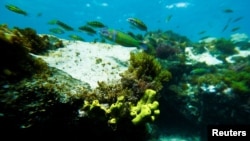The Mediterranean is the world’s largest enclosed sea – linking Europe with the Middle East and North Africa. It is also the most over-fished sea, but a fight is on to balance the Europeans' love of seafood while preserving its marine wildlife.
The General Fisheries Commission for the Mediterranean, an organization under the U.N.'s Food and Agriculture Organization, has launched a pilot project to encourage more selective practices so that fish that are not fully grown are not caught and discarded — an effort that will preserve stocks for the future.
The pilot is exploring ways of reducing levels of unwanted catch, in particular on European hake and deep-water rose shrimp, in the Strait of Sicily. The two species are currently as risk for over-fishing.
However, an alliance of environmental organizations says that one of the biggest risks to the health of the Mediterranean Sea is the continued illegal practice called kiss – or bottom – trawling, fishing with a weighted net, a process often used by small vessels.
The practice – which is damaging marine habitat off the Kerkennah Islands and the Gulf of Gabes in the south of Tunisia – is exacerbated by consumer demand in Italy and Spain for fish, octopus, squid and prawns.
Scientists say the dredging of the ocean floor puts seagrass meadows at risk.
Amelie Giardini, an ocean campaigner with the UK-based non-governmental organization Environmental Justice Foundation, explained that the meadows are essential nurseries for marine wildlife in the Mediterranean, including endangered species of sharks, marine turtles and key commercial species.
The seagrass, she said, "is also essential for climate change mitigation and adaptation. To give you an idea, it can sequester carbon at up to 70 times the rate of tropical rain forests."
Around the Kerkennah Islands artisanal fishers use an ancient, low impact technique which traps fish in a maize of palm fronds called charfiyah. The procedure has been recognized by UNESCO as a global heritage but despite the protection, they are losing their livelihoods to the trawlers.
Guardini said the Tunisian government should eradicate kiss trawling, but also support the fishers while they move away from the practice.
"A well-managed network of marine protected areas," she said, "is essential to ensuring the protection of the seagrass meadows, but the responsibility here is also shared with importing countries – the European Union, in particular Italy and Spain – have to ensure that no product ends up on their plates."
The battle to save Tunisia’s section of the Mediterranean Sea isn't just being fought by big organizations but by grassroots local associations that continually monitor the country’s coastlines.
Kerkennah's Young Scientists Association is engaging the public to monitor turtle populations using a smartphone app called eTurtle. The app, considered to be a "citizen science application," encourages people to share observations and reports on threats and interactions with sea turtles.
The crisis of over-fishing in the Mediterranean may not be over, but efforts such as a selective trawling project in Sicily show that there is the possibility for environmentalists and commercial fishers to work together.
What they all agree on is that governments need to be as vigilant and committed as those living on the coast.

Forum